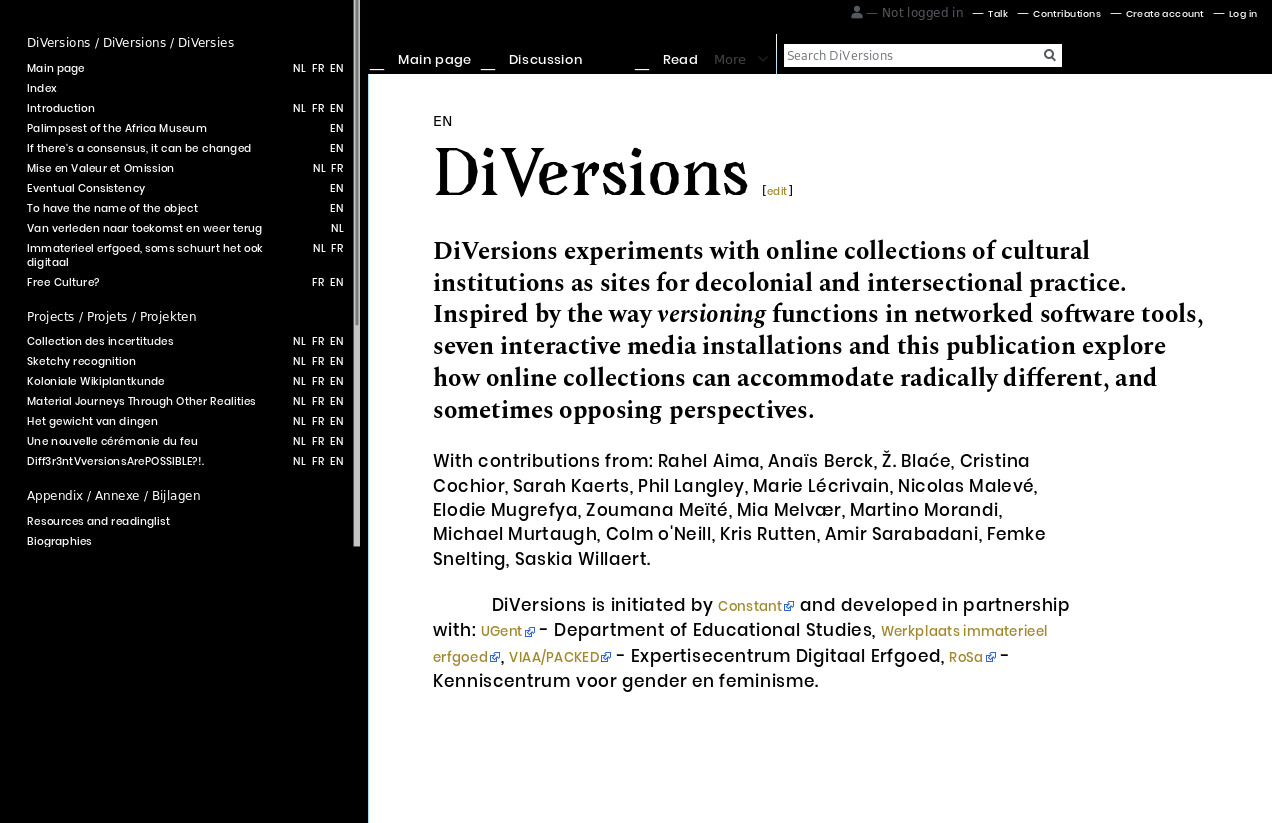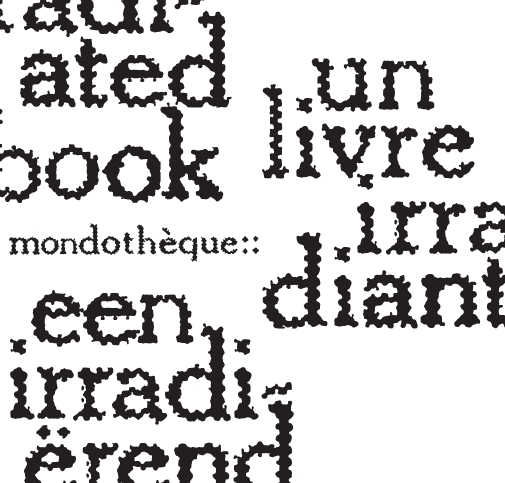DiVersions (2019) [NL, FR, EN]
Filed under wiki book | Tags: · archive, augmented reality, classification, collecting, cultural heritage, data, database, decolonization, interface, intersectionality, queer, software

“DiVersions experiments with online collections of cultural institutions as sites for decolonial and intersectional practice. Inspired by the way versioning functions in networked software tools, seven interactive media installations and this publication explore how online collections can accommodate radically different, and sometimes opposing perspectives.”
With contributions from: Rahel Aima, Anaïs Berck, Ž. Blaće, Cristina Cochior, Sarah Kaerts, Phil Langley, Marie Lécrivain, Nicolas Malevé, Elodie Mugrefya, Zoumana Meïté, Mia Melvær, Martino Morandi, Michael Murtaugh, Colm o’Neill, Kris Rutten, Amir Sarabadani, Femke Snelting, Saskia Willaert.
Edited by Constant (Elodie Mugrefya, Femke Snelting)
Publisher Constant, Brussels, October 2019
Free Art License 1.3
Algolit: Data Workers (2019) [English/French]
Filed under book, catalogue, wiki book | Tags: · algorithm, artificial intelligence, data, literature, machine learning, natural language processing, poetry, text

“Companies create artificial intelligence (AI) systems to serve, entertain, record and learn about humans. The work of these machinic entities is usually hidden behind interfaces and patents. In the exhibition, algorithmic storytellers left their invisible underworld to become interlocutors.
The data workers operate in different collectives. Each collective represents a stage in the design process of a machine learning model: there are the Writers, the Cleaners, the Informants, the Readers, the Learners and the Oracles. The boundaries between these collectives are not fixed; they are porous and permeable. At times, Oracles are also Writers. At other times Readers are also Oracles. Robots voice experimental literature, while algorithmic models read data, turn words into numbers, make calculations that define patterns and are able to endlessly process new texts ever after.
The exhibition foregrounded data workers who impact our daily lives, but are either hard to grasp and imagine or removed from the imagination altogether. It connected stories about algorithms in mainstream media to the storytelling that is found in technical manuals and academic papers. Robots were invited to engage in dialogue with human visitors and vice versa. In this way we might understand our respective reasonings, demystify each other’s behaviour, encounter multiple personalities, and value our collective labour.
It was also a tribute to the many machines that Paul Otlet and Henri La Fontaine imagined for their Mundaneum, showing their potential but also their limits.”
Texts: Cristina Cochior, Sarah Garcin, Gijs de Heij, An Mertens, François Zajéga, Louise Dekeuleneer, Florian Van de Weyer, Laetitia Trozzi, Rémi Forte, Guillaume Slizewicz.
Publisher Constant, Brussels, 2019
Free Art License
52 pages
PDF, PDF, HTML (English)
PDF, PDF, HTML (French)
Git
Mondothèque: A Radiated Book / Un livre irradiant / Een irradiërend boek (2016) [EN, FR, NL]
Filed under book, wiki book | Tags: · architecture, archive, book, classification, data, document, google, internet, knowledge, library, web

“This Radiated Book started three years ago with an e-mail from the Mundaneum archive center in Mons, Belgium. It announced that Elio di Rupo, then prime minister of Belgium, was about to sign a collaboration agreement between the archive center and Google. The newsletter cited an article in the French newspaper Le Monde that coined the Mundaneum as ‘Google on paper’. It was our first encounter with many variations on the same theme.
The former mining area around Mons is also where Google has installed its largest datacenter in Europe, a result of negotiations by the same Di Rupo. Due to the re-branding of Paul Otlet as ‘founding father of the Internet’, Otlet’s oeuvre finally started to receive international attention. Local politicians wanting to transform the industrial heartland into a home for The Internet Age seized the moment and made the Mundaneum a central node in their campaigns. Google — grateful for discovering its posthumous francophone roots — sent chief evangelist Vint Cerf to the Mundaneum. Meanwhile, the archive center allowed the company to publish hundreds of documents on the website of Google Cultural Institute.
While the visual resemblance between a row of index drawers and a server park might not be a coincidence, it is something else to conflate the type of universalist knowledge project imagined by Paul Otlet and Henri Lafontaine with the enterprise of the search giant. The statement ‘Google on paper’ acted as a provocation, evoking other cases in other places where geographically situated histories are turned into advertising slogans, and cultural infrastructures pushed into the hands of global corporations.
An international band of artists, archivists and activists set out to unravel the many layers of this mesh. The direct comparison between the historical Mundaneum project and the mission of Alphabet Inc speaks of manipulative simplification on multiple levels, but to de-tangle its implications was easier said than done. Some of us were drawn in by misrepresentations of the oeuvre of Otlet himself, others felt the need to give an account of its Brussels’ roots, to re-insert the work of maintenance and caretaking into the his/story of founding fathers, or joined out of concern with the future of cultural institutions and libraries in digital times.” (from the Introduction)
Editorial team: André Castro, Sînziana Păltineanu, Dennis Pohl, Dick Reckard, Natacha Roussel, Femke Snelting, Alexia de Visscher
Publisher Constant, Brussels, Sep 2016
Free Art License 1.3
ISBN 9789081145954, 9081145959
225 pages
HTML (updated on 2019-5-31)
Git
PDF, PDF (43 MB)

